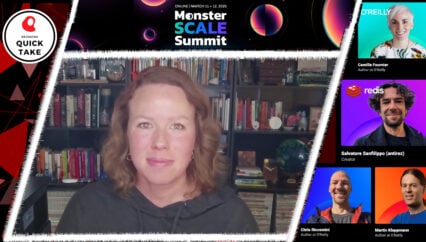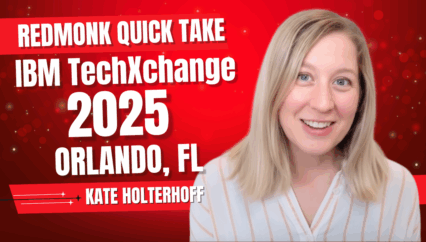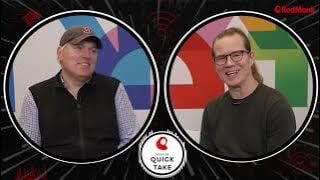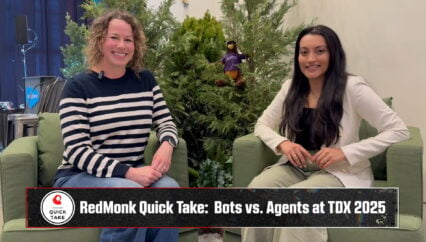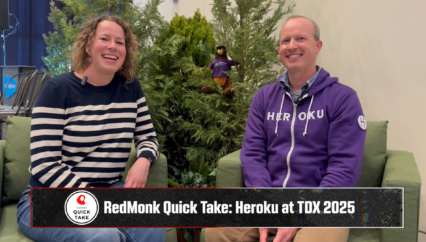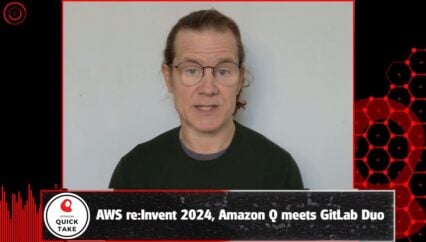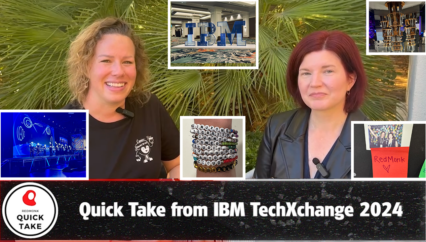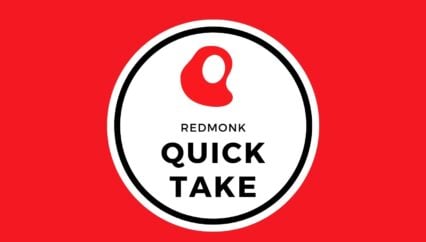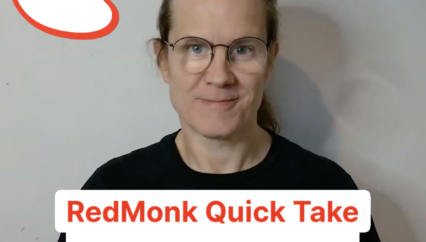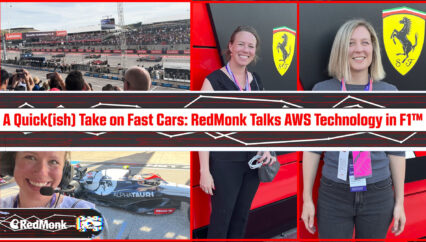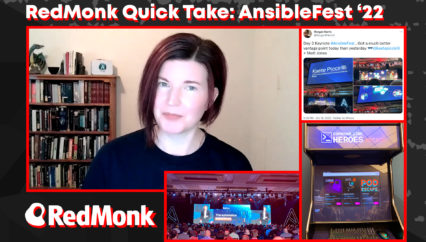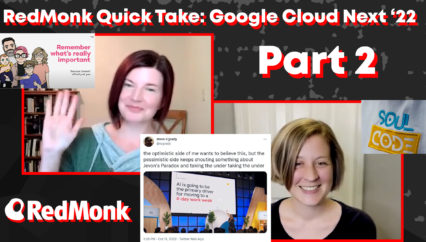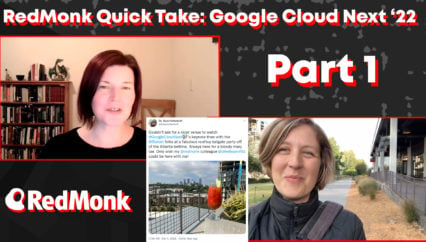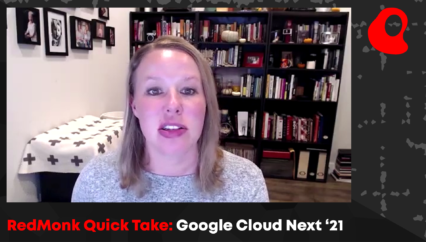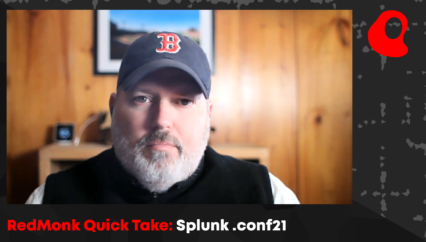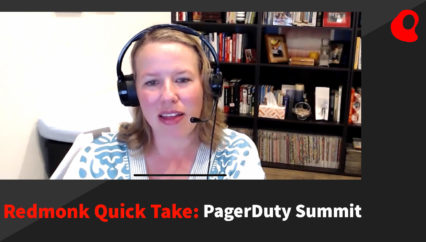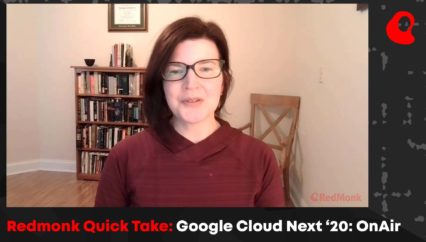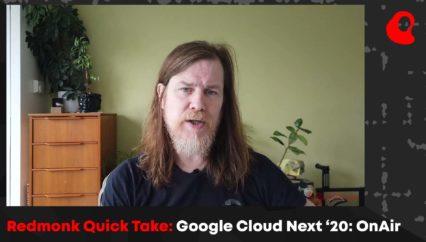James Governor, co-founder of RedMonk, discusses Google Cloud Summit London 2024 in this quick take video.
This was a RedMonk video, sponsored by Google.
Links
Transcript
Hey, it’s James from Redmonk. I’m here with another Quick Take. This one is about the Google Cloud London Summit. I’ve been there the last couple of days. And what were my impressions? Basically, I Google did a pretty good job. I enjoyed the keynote on day one, keynote on day two. It was a bit more technical. That was really pretty good as well. But let’s talk about that keynote on day one. Here’s the thing. I have talked to literally hundreds of vendors about AI over the last couple of years.
I have been to many keynotes and I’ve been to multi-day events. It is very easy to get caught up in long list of products in this business when it comes to technical marketing. It’s not always the best idea. And actually I think at the cloud summit, Google Cloud did a pretty good job of doing storytelling. They didn’t spend 45 minutes listing every LLM model
that they supported. They were pretty happy to highlight Gemini, which is Google’s own model, and go from there. Also on the subject of storytelling, Yasmeen Ahmad is one of their executives, and I thought she did a really good job of telling the story. Certainly a story that enterprises might be interested in. For example, she focused on dark data. Think about all the stuff that might be in documentation, photos, and imagery.
PDFs, of that stuff, that’s dark data. You can’t normally bring that together into your estate of useful data. However, with LLMs, you can. Now, a lot of the conversation about LLMs is focused on the chat interface. You know, chat GPT and the clue is in the name, right? Well, what Google’s doing is saying, well, hang on a second. We can use those LLMs. This is the story that Yasmeen told pretty well. To actually begin to pull that data together,
so that we can begin to ask questions of it, then humans will be in the loop. We can augment what they’re doing by being able to see that dark data and bring it into the equation. They actually had a customer example on stage. So Kingfisher is a retailer of DIY and home improvement products. And for them, if you think about it, and this would be relevant whether you were a developer or whether you’re someone that’s doing home improvement,
Of course when you are trying to find a product, you want to be able to do a search with an image. And when you do that search with an image, you also want that to be correlated with the documentation, which as I say, is often a PDF. You want to click the button and have that in front of you when you make a purchasing decision. The same is true if you are in customer support or you’re out in the field. So I think tying all that stuff together, look, it’s not that it’s been
impossible before, but LLMs are getting increasingly good at allowing the stuff to be pulled together. And that was, as I say, a good bit of storytelling. Google also needs to tell the story of tying together its data assets and strengths with some of the new AI capabilities. This is important. Customers actually that began to look at Google as an alternative and adopt the Google Cloud as an alternative to Amazon and Azure.
One of the things that attracted them was its data chops. So Google has to do a good job of that. They’ve now got a lot of the AI functionality finding its way into the data products. So as Ahmad had said, if you look at data governance in BigQuery, if you look at the fact that you can now do vector search using the span algorithm, which is the same one that underpins Google Search and YouTube,
Again, that’s made its way into BigQuery. If you want to start thinking about, well, how can we do AI meets some of the streaming models with BigQuery? OK, we’re going to integrate LangChain with that. There are a lot of these sorts of announcements. And that’s the kind of thing that enterprises want to see. And the bottom line is you’re not going to have a successful AI strategy if you don’t have a really solid foundation in terms of data management.
and infrastructure. So Google’s investing there. Talking about Google investments. So I think on day two, we had the opportunity for Amit Ganesh, who runs product engineering for Google’s data products to take the stage. I also had a half an hour one-to-one with him. It was fun to nerd out. What do we nerd out about? Largely Postgres. So AlloyDB is Google’s implementation of Postgres.
Google claim it’s got some googly goodness is a little bit faster in some cases up to four times faster I’ll leave the benchmarking up to you. But frankly if you want a hosted Postgres database Google will provide one and Alloy is what they’re doing which is their own as I say that they’re pushing the scalability availability reliability characteristics as a differentiator. One of the areas there where they’re investing again and claiming performance
That will be better than the native implementation will be around pgvector, which is the vector search data type that Postgres basically supports.
Amit also talked about Firebase. That’s important. Developer favorite. Google’s giving that a lot more attention. After seemingly I was worried that they were going to neglect it, but recently they’ve definitely been investing in that regard. Some pretty interesting stuff. You can now have Firebase connected in the cloud with relational database so that you can kind of in their mind have a sort of a hybrid in the best of both worlds. So a lot of announcements that were about integration, a lot that were about that data foundation.
And frankly, there was a lot to like, I’m not going to try and tell you every announcement. I think that’s obviously Google’s job. But overall, I think if you’re going to do good storytelling, which you need to do, and you are going to have a good conversation about what enterprises actually want and need, you’re going to be in pretty good shape. you know, I came away overall thinking that it was a good event. You know, there was stuff that here I am. it’s a day after and I’m ruminating. I’ve been able to
I tie up some of those messages and understand, I think, what Google was trying to say. So good job. And yeah, it’s worth mentioning. This video was sponsored. So take that into account. But overall, the reason I’m positive is that the event was. Anyway, that’s my quick take. James Governor of RedMonk and over and out.
